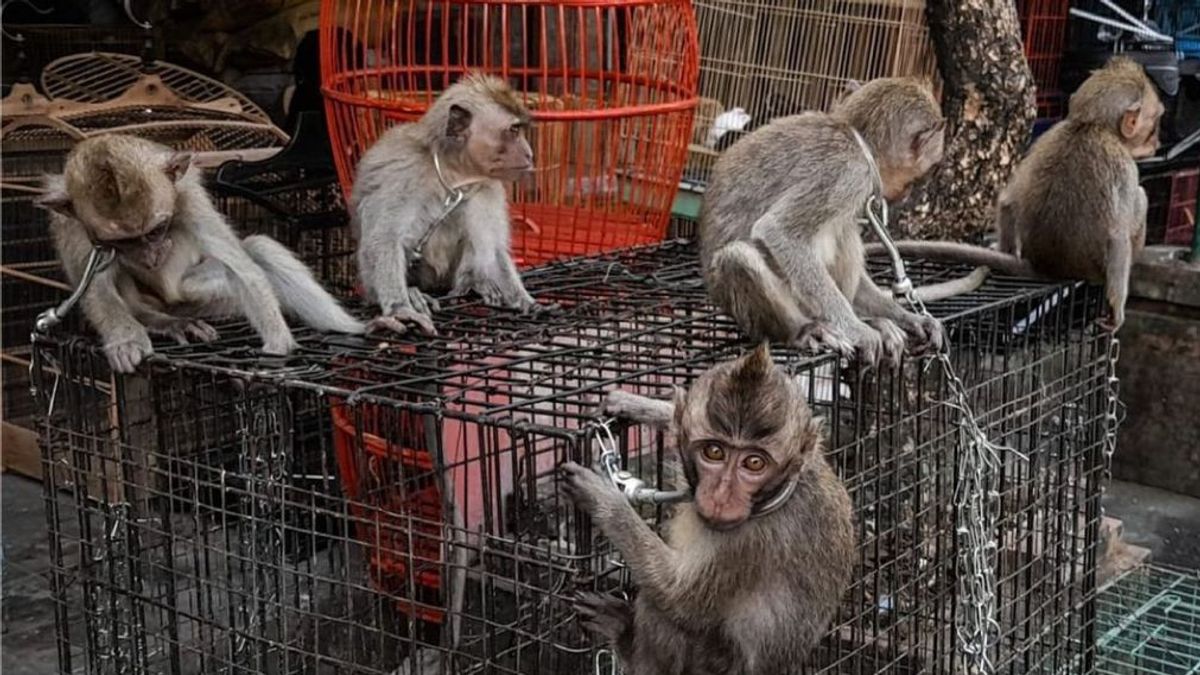DENPASAR - The head of the Bali Conservation and Natural Resources Agency (BKSDA), R Agus Budi Santosa, responded to criticism from Jakarta Animal Aid Network (JAAN) activists regarding the sale of long-tailed macaque chicks or macaca fascicularis at the Satria Bird Market, Denpasar.
BKSDA said the population of long-tailed macaques in Indonesia is still relatively large. In addition, monkeys are mammals that are very easy to survive and adapt easily to the human environment.
"No, there is no competition with other ape species and there are no predatory animals. This baby gray ape may be safer and more prosperous being kept by humans than being deprived of food and being killed by fellow apes in the wild," Santosa said in a written statement, Monday, 27 September.
"In addition, it is very rare to find this type of monkey torture in Bali. Because, many believe that this monkey is an incarnation or descendant of Lord Hanuman who deserves respect," he added.
The Bali BKSDA said these animals are not protected by law and tend to become pests if the population is not controlled. Meanwhile, the Ecosystem Natural Resources Conservation Law (KSDAE) of the Ministry of Environment and Forestry cannot be applied to punish the perpetrators of this animal trade.
"The perpetrators of the trade in monkeys can only be subject to the article on animal torture according to the article of the Criminal Code. Even then, if it is clearly proven that they have been tortured and the offense of torture is fulfilled," he said.
Santosa said the trade in baby monkeys of this type is difficult to monitor because the animals are small, tame and easy to hide.
"But according to the regulations, the ape trade cannot be punished severely because the animals are not protected by law," he said.
In addition, according to him, the raids for this type of ape are very inefficient and there is no comparison between the conservation value and the weight of the error compared to the operational costs and maintenance costs if the animals are confiscated.
"The circulation can actually be regulated by a regional regulation, because it is a tipping and the sanctions are more inclined to administrative sanctions. For that, it is necessary to approach and communicate with the local government," said Santosa.
Previously, the Jakarta Animal Aid Network (JAAN) criticized the sale of baby long-tailed monkeys or macaca fascicularis at the Satria Bird Market, Denpasar, Bali.
Femke den Haas, one of the founders of JAAN, explained that in Bali there are still many sellers of baby long-tailed monkeys at the Satria Bird Market, Denpasar.
"There are at least two stalls selling long-tailed monkeys in the market. Most of these monkeys are very young," said Femke in a written statement, Friday, September 24.
From the confession of a trader, Femke said that these monkeys are imported almost every month from Sumatra. Of course, this is illegal, because it is forbidden to introduce rabies-transmitting animals (HPR) into the island of Bali.
This refers to the Decree of the Minister of Agriculture No. 1696/2008, concerning the prohibition of importing dogs, cats, monkeys and the like into Bali.
In addition, the sale of primates in the bird market has the potential to violate Article 302 of the Criminal Code concerning animal abuse, Law Number 18 of 2009 concerning Livestock and Animal Health and Government Regulation Number 95 of 2012 concerning Veterinary Public Health and Animal Welfare.
"Then the method of obtaining and transporting these monkeys also violates the Minister of Forestry Regulation No. P-63/Menhut-II/2013, concerning procedures for collecting wild plant and animal specimens," he added.
The English, Chinese, Japanese, Arabic, and French versions are automatically generated by the AI. So there may still be inaccuracies in translating, please always see Indonesian as our main language. (system supported by DigitalSiber.id)










